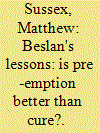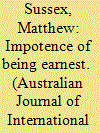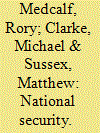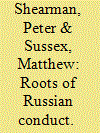| Srl | Item |
| 1 |
ID:
057639


|
|
|
| 2 |
ID:
107230


|
|
|
|
|
| Publication |
2011.
|
| Summary/Abstract |
This article critically evaluates Australia's 'creative middle power diplomacy', encapsulated in the three pillars of the Labor government's foreign policy platform. It notes that each pillar has been accorded specific roles in the implementation of Australian foreign policy and makes particular reference to the government's preference for multilateral engagement. The article subsequently demonstrates that such an agenda actually impedes a creative approach to key issues such as trade, climate change and non-proliferation challenges, as well as Australia's participation in Asia-Pacific order-building. It then offers some suggestions for a more flexible posture that is not inconsistent with past Labor approaches, but which also better appreciates regional and global complexities.
|
|
|
|
|
|
|
|
|
|
|
|
|
|
|
|
| 3 |
ID:
154808


|
|
|
|
|
| Summary/Abstract |
In the process of bringing together this special issue of the Australian Journal of International Affairs, we were struck by how frequently the term ‘national security’ is used and abused, by both academics and policymakers. Some use it to refer to conventional statist threats. Others employ it as a broad catch-all for anything that may create or imply harms against anyone in a particular polity. Still others use the term to justify an array of populist and politicised policy choices with apparently little to justify the link between the threat and the referent object—that is, the thing being secured.
|
|
|
|
|
|
|
|
|
|
|
|
|
|
|
|
| 4 |
ID:
089328


|
|
|
|
|
| Publication |
2009.
|
| Summary/Abstract |
This article examines the reasons behind Russia's decision to go war with Georgia in August 2008. It evaluates the key potential drivers of Russian policy relating to structural, domestic and perceptual factors.
|
|
|
|
|
|
|
|
|
|
|
|
|
|
|
|
| 5 |
ID:
154810


|
|
|
|
|
| Summary/Abstract |
Russia’s return to prominence in international affairs has been in many respects surprising. Russia’s easy seizure of Crimea, its role in Syria and its ambitious pivot eastward have emboldened Moscow at a time of crisis for the liberal order. This article characterises Russian national security policy as a deliberate ‘rebound’ strategy, designed to deliver a rapid return to power and status. The author defines rebounding in respect to four characteristics: a relatively short timeline for the rebounding state to achieve its goals; a strategic (re-)emphasis on territory and hard power; the construction of alternative networks of influence via institutions; and active efforts to undermine existing normative and legal orthodoxies. The author then assesses these in terms of specific Russian national security policy objectives, including in the key domain of information operations. The article concludes that Vladimir Putin has skilfully employed conventional material capabilities and geopolitics, combined with the exploitation of contemporary information networks for instrumental purposes. Paradoxically, though, those same factors will constrain Russian national security objectives in the future.
|
|
|
|
|
|
|
|
|
|
|
|
|
|
|
|
| 6 |
ID:
112794


|
|
|
|
|
| Publication |
2012.
|
| Summary/Abstract |
This article critically engages with recent scholarship that casts Russian foreign policy either in terms of a gradual evolution towards neo-imperialism, or alternatively as an episodic series of shifts on issues such as terrorism, energy, relations with great powers, and Russia's geostrategic position in contemporary international politics. It argues that since the end of the Cold War what has been striking about Russian foreign policy has been its continuity. To do this it examines several key policy arenas, including Russia's attempts to construct regional architecture to embed its hegemonic position; its recent preference for resource diplomacy, and its use of military force. It finds that while Russia has struggled to maintain hegemony in the former Soviet space due to the ongoing problem of weak material capabilities, the 'assertive' form of realism that characterizes its foreign policy has not altered significantly since shortly after the collapse of the USSR.
|
|
|
|
|
|
|
|
|
|
|
|
|
|
|
|